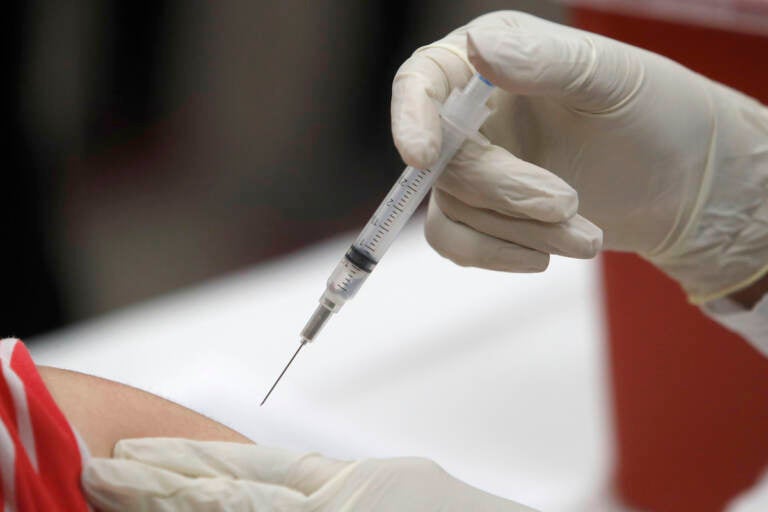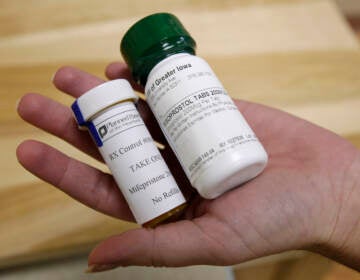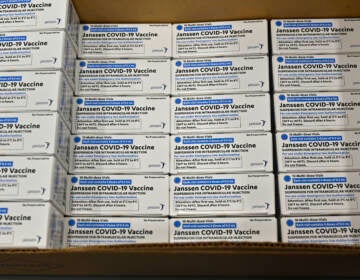Philly health officials urge flu vaccine for kids as hospitals reach their limits
Children’s Hospital of Philadelphia is already feeling the strain of providing for patients as flu season adds to demand from COVID-19.

File photo: A syringe with an influenza vaccine inside heads to its mark during a flu vaccination at Eastfield College in Mesquite, Texas, Thursday, Jan. 23, 2020. (AP Photo/LM Otero)
The lack of immunity among children has made this year’s flu season very unpredictable.
Last year saw a mild flu season compared to prior years, because of widespread social distancing and mask wearing in response to the coronavirus. During the 2019-2020 season, about 22,000 people died of flu in the United States, according to the Centers for Disease Control and Prevention.
Scientific American has reported that the 2020-2021 flu season saw the illness drop to relatively low levels, with about 700 people dying.
At a press conference Thursday, Philadelphia’s health commissioner, Dr. Cheryl Bettigole, warned that because many people have relaxed precautions against the coronavirus for the holidays, the city is expecting a worse flu season this year compared to 2020.
With hospitals already near capacity, Bettigole said that even a small number of flu hospitalizations could overload health care systems.
Among those most at risk are children who have gone back to in-person learning.
“That’s because a lot of kids, particularly younger children, may be more vulnerable to infection, because their immune systems have not been challenged to build immunity against the flu over the last two years, when we’ve taken measures like social distancing and masking,” Dr. Ron Keren, chief medical officer at Children’s Hospital of Philadelphia, said at the press conference.
Most children who have been born over the last year and a half have no immunity to the flu unless they’ve gotten a flu vaccine.
Flu, coupled with the demand for COVID-19 care, has put a strain on children’s hospitals. Since July, CHOP has been routinely operating close to or above 100% capacity.
“At CHOP, we started to see kids in our primary care practices, emergency department, and in-patient units sick with the flu,” Keren said.
CHOP has already seen twice as many flu-related emergency room visits than it did in prior years. Nationwide, the percentage of kids vaccinated against the flu this year is much lower than in previous years.
According to CDC data for children ages 6 months to 17 years, Philadelphia is 11% behind in flu vaccination rates compared to the same time last year, and 19% behind where it was in 2019.
“I’m very concerned about what this could mean for children’s hospitals this winter. All hospitals, but particularly children’s hospitals, are struggling to manage the large number of patients needing in-patient care,” said Keren.
Because many kids are now back in the classroom and in sports and other extracurricular activities, they are more likely to be exposed to the flu, and that could result in a much higher number of infections.
“If we have a particularly bad flu season this year, it’ll make it challenging to provide care to all the children who need it. To help us avoid this situation, please get your children vaccinated,” Keren said.
Dr. Tyra Bryant-Stephens, medical director of the Community Asthma Prevention Program and senior director of the Center for Health Equity at Children’s Hospital of Philadelphia, highlighted the higher risk of infection among people of color. According to the CDC, Black children had lower flu vaccination coverage than children in all other racial/ethnic groups in the 2020–2021 season.
“It’s no surprise that just as the pandemic has been more detrimental to people of color, we’re also more likely to experience a higher risk of severe influenza illness. This is very worrisome for me,” Bryant-Stephens said.
Other people at especially high risk include adults over 65, residents of nursing homes and long-term treatment centers, pregnant individuals, and people with pre-existing conditions.
The Health Department is strongly recommending that everyone over 6 months of age get a flu shot. People can get flu shots at the same time as the COVID vaccine or booster.
Earlier this week, Bettigole advised against holiday gatherings of multiple households, saying that, as a health professional, she believes it’s necessary to stop the spread of the virus.

Saturdays just got more interesting.
WHYY is your source for fact-based, in-depth journalism and information. As a nonprofit organization, we rely on financial support from readers like you. Please give today.





![CoronavirusPandemic_1024x512[1]](https://whyy.org/wp-content/uploads/2020/03/CoronavirusPandemic_1024x5121-300x150.jpg)


